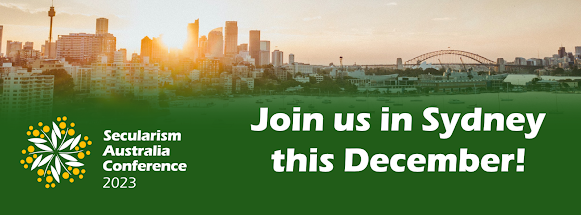Si Gladman / 06 November 2023
The Minns government will privilege the voice of religious communities and discriminate on the ground of belief in refusing to allow a non-religious person on the state’s new Faith Affairs Council.
Earlier today, an official informed the president of Sydney Atheists, Steve Marton, that the government had rejected his nomination to represent the state’s non-religious and ex-religious population on the 16-member body.
The official from Multicultural NSW told Mr Marton (pictured) that the Faith Affairs Council was for religious communities only and non-religious people could instead be appointed to other bodies.
The outcome means that religious leaders will gain even greater influence over government policy, with the body to have direct access to ministers and be able to advise government to provide extra benefits and resources for religious people.
Premier Chris Minns and multiculturalism minister Stephen Kamper have promised that the Faith Affairs Council will be able to advise on matters including additional state funding for chaplaincy programs, “objections to euthanasia/voluntary assisted dying”, and religious discrimination laws.
Mr Marton told the Rationalist Society of Australia he was “disappointed” to be overlooked for a position on the council.
“I was advised that there were other bodies that people of ‘no religion’ would be on. However, I reminded the officer that those bodies did not directly engage on the matter of religious impropriety in their many facets,” he said.
“There are people who are suffering because of the actions of religion who will not be represented on the Faith Affairs Council.”
In his nomination for a position, Mr Marton argued it would be “an injustice” to exclude the non-religious community, given that the Faith Affairs Council would be influencing government policy on matters that affect all people, including atheists, humanists, non-religious and ex-religious people.
A Christian minister endorsed Mr Marton’s application, saying it was important for the Faith Affairs Council to “provide a voice” to people who were moving away from religion.
“In a secular society which values freedom of religion and faith positions, and where atheism is a rapidly growing group in society, I think it is important to have a level-headed, kind, compassionate voice representing them in the NSW Faith Council,” the Christian leader said in their statement of support.
“Steven is a friendly, gregarious, caring person who values human beings, and the environment.”
As the RSA reported last week, the Faith Affairs Council will be stacked with male religious clerics, with only one of the already appointed 12 representatives being female.

RSA president Dr Meredith Doig said Mr Kamper had failed to deliver on his promise to the New South Wales community that the new advisory body would reflect a “diversity of viewpoints”.
Earlier this year, the RSA warned that the proposed advisory body could privilege the already powerful voices of religious clerics even further in policy making and marginalise the voices of non-religious citizens.
“Despite the non-religious community being the fastest-growing section of the New South Wales community, with the Census showing that increasing numbers of people are walking away from religion, the Minns government is choosing to privilege even further the religious voice,” she said.
“We can only expect that the Faith Affairs Council will now make recommendations to benefit religious communities, while non-religious communities will continue to have no equivalent voice or level of access to government ministers and the policy-making process.
“NSW Labor appears to view the non-religious community and the ex-religious community as second-class citizens.”
Mr Marton said he had written to Minister Kamper seeking a meeting to discuss the matter, but that Mr Kamper had declined.
If you want to support our work, please make a donation or become a member.
Si Gladman is Campaigns & Communications Coordinator for the Rationalist Society of Australia. He also hosts ‘The Secular Agenda’ podcast.





